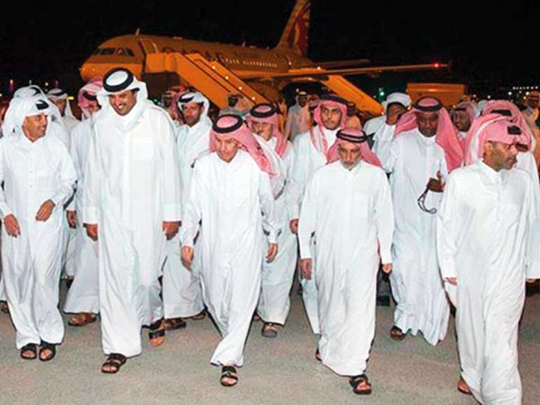
Abu Dhabi: Qatar has earned the brand of the single most-favoured broker for terrorist organisations.
Despite its small population and military power, Qatar has sought to punch above its weight — by expanding its brand and influence abroad.
To this end, Doha spent billions of dollars in ransoms to terrorist organisations across the world including Taliban, Al Qaida, Al Houthis, Al Nusra Front and Daesh.
The modus operandi is financing through kidnapping for ransom.
Ransom payments as brand booster
Doha leaps at the opportunity of hostage-takings, pay ransoms and boost its brand and influence with countries of victims and — of course — with terrorist groups.
What happens is that the terrorist group Al Nusra kidnaps a group of Fijian, Italian, Lebanese, Syrian, or Turkish nationals, throwing in the occasional American for good measure.
Then, friend-to-the-world Qatar will sweep in and pay Al Nusra to return the hostages: $150 million (Dh550.9 million) for the Turks, $20 million for the Fijians, $30 million for the Lebanese, $16 million for the Syrians, $15 million for the Italians, and $150 million for the American.
Often the hostages are humanitarian aid workers, nuns, bishops, UN peacekeepers — people especially lauded by the West.
Once Sister Christian from the village of Maalulahas has been released, the world erupts in glorious thanks.
Through this method, Qatar has been openly funding Al Nusra since 2013. Nevertheless, it boasts of their “achievement of humanitarian and moral principles.”
Political favour to US
In another episode, the Qataris took the Taliban Five terrorists in what seemed to be a political favour to the United States, accepting a quintet of high-ranking ex-Guantanamo detainees.
This way, the Qataris give moral support to insurrectionists, asylum for terrorists, a diplomatic foothold for the Taliban-in-exile and a blind eye turned to terrorist financing via a network of fund-raising activities that operates in the open and permissive banking legerdemain.
“It is well known that to find the terrorists, you have to follow the money and at the moment it seems to be coming from Qatar,” said Professor Anthony Glees of the Centre of Security and Intelligence Studies, University of Buckingham.
Trigger
A ransom of up to $1 billion paid by Qatar to Iranian and Al Qaida-linked terrorists in Syria to release kidnapped members of the country’s royal family may have been a trigger behind six nations’ cutting ties with Doha, officials have claimed.
The hefty ransom reportedly secured the release of 26 members of a falconry party, which included some members of Qatar’s royal family, who were kidnapped while hunting in southern Iraq in December 2015.
Qatar paid the ransom to an Al Qaida affiliate fighting in Syria and Iranian security officials, a person involved in ransom negotiations said in April.
Dangerous contradiction
Yousuf Al Otaiba, UAE ambassador to the United States, said it is a striking and dangerous contradiction: Qatar invests billions of dollars in the US and Europe and then recycles the profits to support Hamas, the Muslim Brotherhood and groups linked to Al Qaida.
“Qatar hosts the American military base from which the US directs the regional war against extremism, yet it also owns media networks responsible for inciting many of the same extremists,” Al Otaiba said.
Dr David Andrew Weinberg, a Senior Fellow at the Foundation for Defence of Democracies, a think-tank in Washington, DC, investigating Qatar’s links to terror funding, cited repeated allegations from officials of Mideast or Western governments to news outlets alleging that Qatar paid multimillion dollar ransoms to terrorist organisations.
Ransom money takers
“In most instances, the purported recipient of such alleged Qatari ransoms was Al Qaida’s Syrian branch, but Qatar has also been accused of paying ransoms to Al Qaida in the Arabian Peninsula and, more recently, to Kataib Hezbollah in Iraq and to the terror-sponsoring government of Iran,” Weinberg said.
Saudi Arabia, UAE, Egypt and Bahrain have collectively designated 59 individuals and 12 institutions that have financed terrorist organisations and received support from Qatar.
“The Kingdom of Saudi Arabia, the Arab Republic of Egypt, the United Arab Emirates, and the Kingdom of Bahrain are unified in their ongoing commitment to combating terrorism, drying up the sources of its funding, countering extremist ideology and the tools of its dissemination and promotion, and to working together to defeat terrorism and protect all societies from its impact,” the countries said in a statement.
The majority of those entities sanctioned are linked to Qatar and are a manifestation of a Qatari Government’s policy of duplicity, the statement read.
In 2015, two senior Taliban officials travelled in and out of Qatar to meet members of the notorious Taliban Five — high-level prisoners from Guantanamo Bay who were traded to Qatari custody by the Obama administration for American prisoner Sgt. Bowe Bergdahl.
The Qataris facilitated the swap through the Taliban embassy they helped stand up in Doha.
Taliban's fund-raising locale
Leaked cables show US officials have long worried about how the Taliban and others may “exploit Qatar as a fund-raising locale.”
There is also the Palestinian terrorist group Hamas, which enjoys safe haven in Qatar and also raises plenty of cash.
Outgoing leader Khaled Meshal has long operated out of Doha. Hamas military official Saleh Arouri — suspected of masterminding the kidnapping and murder of three Israeli teens, sparking the 2014 war between Hamas and Israel — is now reportedly in Qatar after being booted out from Turkey.
Despite all this, officials in Washington often turn a blind eye.
Maybe it’s the value of the Al Udeid airbase, or Qatar’s massive foreign-investment portfolio. Or perhaps it’s some other reason.
Track record overlooked
When the George W. Bush administration launched the war on terror, it overlooked Qatar’s track record, including the fact that the 9/11 attacks mastermind, Khalid Shaikh Mohammad (KSM), had found shelter on Qatari soil.
Neither Bush nor Obama punished the Qataris for terrorism finance.
Indeed, Qatar should have been designated as a state sponsor of terrorism by the State Department. It never was.











